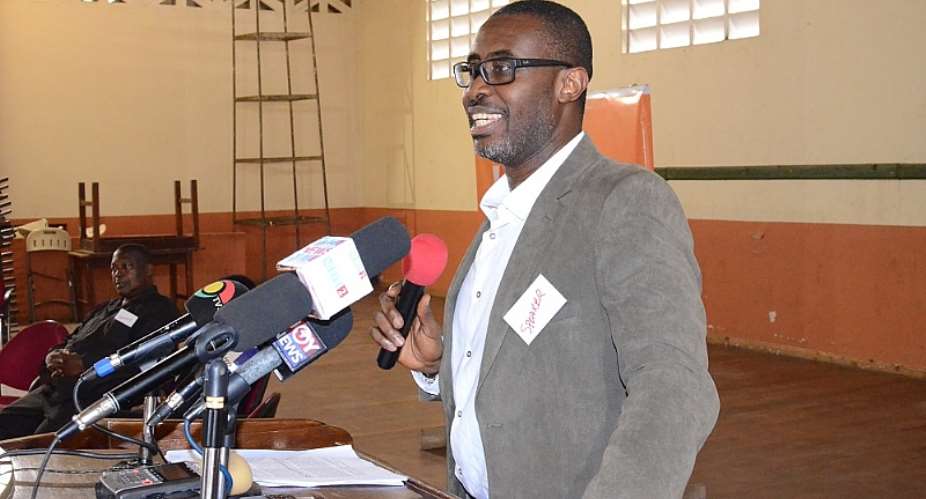Constitutional lawyer Ace Ankomah has stated that the Supreme Court did not erred in the contempt case against the Montie 3, disagreeing with respected lawyers such Professor Stephen Kwaku Asare aka Kwaku Azar.
The Montie 3, Salifu Maase aka Mugabe, host of Montie FM's 'Pampaso' political programme and two panelists Godwin Ako-Gunn and Alistair Nelson, were each sentenced to four-months' imprisonment by the Supreme Court.
The convicts made disparaging comments about some Supreme Court judges who heard an election related case.
Even though Prof Asare and others insist the court does not have the power to do so, Mr Ankomah, who is a senior Partner at Bentsi-Enchill, Letsa and Ankomah Chambers, said the court made no mistake.
Speaking at a symposium in organized by the Forum for Media Accountability and Democratic Governance (FOMADEG) in collaboration with Occupy Ghana, Lawyer Ankomah said Common Law procedure talks about committal without application which those who criticize the court's decision fail to recognize.
“Nothing in rule one: rule one deals with the fact that a party does not bring an application or in other case the Attorney General] affects the power of the court to make an order on its own motion [suo moto] against a person to show cause why the person should not be committed for contempt of court…and so Ghana law recognizes that the court itself has the power: the court has that power.”
He also denied claims that contempt can only be commenced by the Attorney-General, saying “that's not true.”
In a case titled Ackah versus Adjei Acheampong 2005, the same Supreme Court judges said that in respect of Common law contempt of court, it is not an Article 898 power vested in the Attorney General; so the Attorney General even if he comes under this circumstances is not trying an offence. The Attorney General is coming in almost as a civil party in Common Law proceeding called quasi proceeding.”
He made reference to the good old English Supreme Court Lord Dening, who in one of his rulings he admitted that contempt 'it is never confined to conduct which a judge saw with his own eyes. It covers all contempt for which a judge of his own can punish a man on the spot, this is an extraordinary power, it should be used rarely where the case is very clear.'
Explaining further, the respected lawyer said, “Speaking for myself, I do not see the wisdom in maintaining scandalizing the court in Ghana.”
He however stressed the need to review the Common Law on contempt to clearly state its parameters “like the way the English have done and not to keep it as open as it's pin the resent state where it gives some form of arbitrariness to the apex court of the law (Supreme Court) in the exercise of its powers.
By Charles Takyi-Boadu





 Supreme Court clears way for dual citizens to hold key public positions
Supreme Court clears way for dual citizens to hold key public positions
 Be transparent, don’t suppress the truth – Prof. Opoku-Agyemang to Jean Mensa
Be transparent, don’t suppress the truth – Prof. Opoku-Agyemang to Jean Mensa
 ‘I won’t tell the world I was only a driver’s mate during challenges’ – Prof Jan...
‘I won’t tell the world I was only a driver’s mate during challenges’ – Prof Jan...
 We’ll prosecute corrupt officials of Akufo-Addo’s govt – Prof Jane Naana
We’ll prosecute corrupt officials of Akufo-Addo’s govt – Prof Jane Naana
 [Full text] Acceptance speech by Prof Jane Naana Opoku-Agyemang as 2024 NDC Runn...
[Full text] Acceptance speech by Prof Jane Naana Opoku-Agyemang as 2024 NDC Runn...
 Election 2024: Don’t be complacent, we haven’t won yet – Asiedu Nketia cautions ...
Election 2024: Don’t be complacent, we haven’t won yet – Asiedu Nketia cautions ...
 Election 2024: Stop fighting over positions in Mahama’s next govt – Asiedu Nketi...
Election 2024: Stop fighting over positions in Mahama’s next govt – Asiedu Nketi...
 Prof Jane Naana Opoku-Agyemang will restore dignity of vice presidency – Fifi Kw...
Prof Jane Naana Opoku-Agyemang will restore dignity of vice presidency – Fifi Kw...
 'Ghana beyond aid' has turned out to be 'Ghana without compass' – Naana Opoku-Ag...
'Ghana beyond aid' has turned out to be 'Ghana without compass' – Naana Opoku-Ag...
 Nation builder Mahama will deliver on his promise of a 24-hour economy for the b...
Nation builder Mahama will deliver on his promise of a 24-hour economy for the b...
